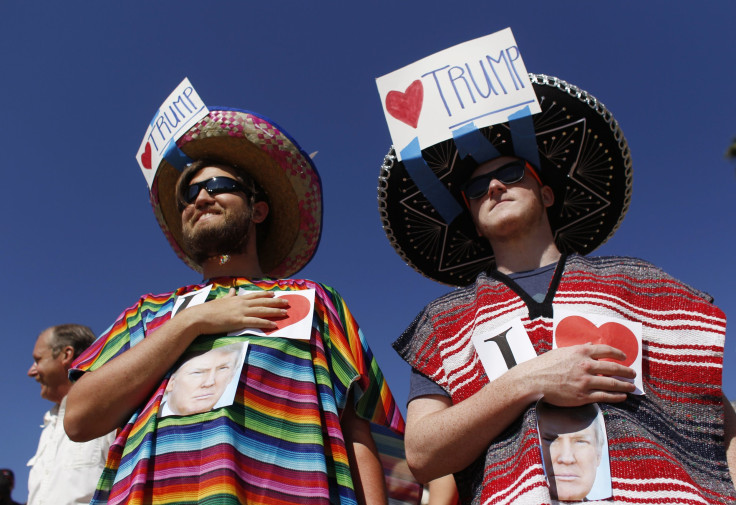Will Donald Trump Be Our Next President? After Arizona, Republicans Hoping To Stop Trump Face Tough Battle

The #NeverTrump movement lost yet another battle Tuesday night. Donald Trump won the Arizona Republican primary, picking up 58 delegates and adding to his delegate lead over the rest of the GOP field.
Trump’s big night was unlikely to change much as the New York businessman continued his march toward securing the Republican presidential nomination. Even as establishment members of the GOP pour millions of dollars into attack ads and hatch plans to stop the front-runner, he shows little sign of slowing down.
“Each day with a primary and caucus that passes, and the trajectory stays what it has been, is a day lost to stop Trump," said Josh Putnam, a political scientist at the University of Georgia and founder of the election website Frontloading HQ. “The race is moving toward to a time in the calendar, an area on the map, that suits Trump and his chances pretty well."
For much of the primary season, the other Republican candidates avoided attacking Trump directly, and the largest super PACs spent their money targeting candidates who have since dropped out of the race. Only in the past few weeks have serious efforts ramped up to “Dump Trump,” and by now, many have speculated the #NeverTrump movement may be too late.
Ahead of Tuesday’s primaries, Trump led Arizona polling with 38 percent while Texas Sen. Ted Cruz held 25 percent and Ohio Gov. John Kasich had 14 percent. Arizona carries 58 delegates, and its winner-take-all status made it far and away the biggest prize Tuesday night.
In Utah, which had 40 delegates at stake, Cuz was expected to best Trump in large part because the state’s significant Mormon population does not like The Donald. Adding to Cruz’s chances, former presidential candidate Mitt Romney, who is a favorite son in Utah, campaigned for the Texas senator and said he would be supporting Cruz over Trump on Tuesday.
But the real question was whether Cruz would be able to pull out support from more than 50 percent of caucus-goers, which would give him all of the state’s delegates. If no candidate gets a majority of the vote, the delegates are divided among the contenders, further propelling Trump forward.
Trump has done well with GOP voters in part by taking a strong stance against the Islamic State group in Syrian and Iraq. In the wake of terror attacks that took place in Brussels early Tuesday, Trump made the case that he was the best man to protect the nation and vowed to bring back torture tactics such as waterboarding. Trump has consistently polled highly when voters are asked which Republican candidate will best deal with terrorism, and his proposal to ban Muslims from the United States was met with support from voters after the Nov. 13 terror attacks in Paris.
“It's true that when people are anxious about terrorism they want protection from that feeling. One of the ways that Trump has made the argument for his candidacy is by saying that he is the one who can protect people from terrorism and from immigration,” said Shana Kushner Gadarian, a political science professor at Syracuse University in New York who studies fear and anxiety in voting. “That’s really what his wall is about. He has also made the argument that his plan to ban Muslims is meant to protect people.”
After Tuesday night, the next nominating contests for Republicans will not take place until April 5 in Wisconsin and April 8 in Colorado. Then, the important New York primary will take place April 19 and a slew of smaller states will vote at the end of that month.
The more sporadic voting schedule could give establishment Republicans time to further develop their attacks and prepare for a contested convention where they hope to nominate a non-Trump candidate. But the closer Trump gets to the 1,237 delegates he would need to clinch the nomination outright, the more difficult it will likely be for Republicans to stop him without alienating his supporters. Trump himself has warned there could be riots if he is not the party’s nominee, and violence has increased at his rallies in recent weeks.
“For the voters who prefer Trump, part of his argument is that the establishment — whatever that means — doesn’t care about you as a voter. So the extent that voters are attracted to Trump because of that message, they might not come back to the Republican Party in the future,” Kushner Gadarian said. “There is very likely going to be a fracturing of the Republican Party this summer.”
© Copyright IBTimes 2024. All rights reserved.






















